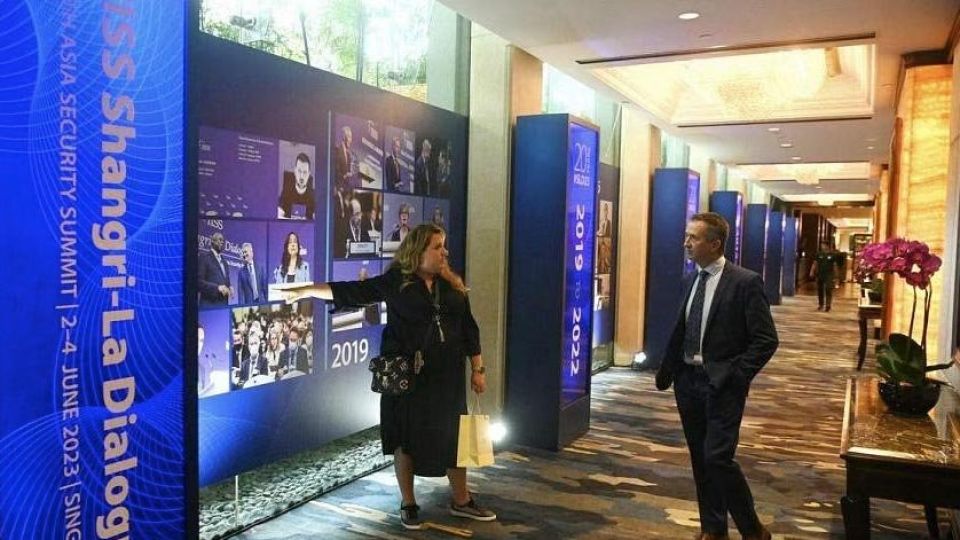June 2, 2023
SINGAPORE – The increasingly strained ties between the United States and China, and implications for Asia from the continuing war in Ukraine, will take centre stage at the region’s top security summit in Singapore this weekend.
The 20th edition of the Shangri-La Dialogue takes place from Friday to Sunday at the Shangri-La Singapore hotel in Orchard Road.
More than 550 delegates from over 40 countries will be at the three-day forum, including US Secretary of Defence Lloyd Austin and Chinese Defence Minister Li Shangfu.
Australian Prime Minister Anthony Albanese will give the keynote address.
Estonian Prime Minister Kaja Kallas and Timor-Leste President Jose Ramos-Horta will also deliver speeches.
Other speakers include Ukrainian Defence Minister Oleksii Reznikov, the defence chiefs of Britain, Germany, Indonesia, Japan and South Korea, as well as the chief of staff of the Philippines’ armed forces.
Ahead of the Dialogue this year, political observers had been anticipating a possible meeting between the US’ and China’s defence chiefs on the sidelines of the summit.
The 2022 forum featured a first meeting between Mr Austin and China’s then defence minister, General Wei Fenghe, which briefly raised hopes for renewed military talks between Washington and Beijing.
But General Li, who became China’s new defence chief in March, had declined Washington’s request for one, the Pentagon said on Monday.
The Chinese Defence Ministry blamed the US for creating “obstacles” that undermined trust and hindered efforts to improve communication between the two powers.
Gen Li has been under US sanctions since 2018 over weapons purchases from Russia.
Mr Austin described Gen Li’s rejection as “unfortunate” and said he welcomed any opportunity to engage with his Chinese counterpart.
Dr Chong Ja Ian, an associate professor of political science at the National University of Singapore, said the lack of a formal bilateral meeting this year indicated the “uneasy, even tense” ties between the two powers.
“But even with a meeting, a breakthrough would have been unlikely,” he said. “Some arrangement to keep talking while friction remains would have been the most likely outcome.”
The quandary that Washington and Beijing are in “reveals fundamentally different visions of the role communication should play in great power relations”, according to Mr James Crabtree, executive director of the Asia office of the London-based International Institute for Strategic Studies (IISS), which organises the Shangri-La Dialogue.
“Seen from Washington, communication is needed most of all during a crisis… (But) Beijing’s view is almost exactly the opposite,” Mr Crabtree wrote in a Straits Times article adapted from an analysis for the IISS.
“China thinks of communication as something that should happen when relations are good. If matters go south, cutting communication channels is the easy way to signal displeasure.”
MORE ON THIS TOPIC
‘Unfortunate’ that Chinese counterpart declined talks: US defence chief Austin
Shadow of Ukraine war over Shangri-La Dialogue
Mr Austin is slated to speak on Saturday about the US’ leadership in the Indo-Pacific, while Gen Li will expound on China’s new security initiatives on Sunday.
Russia’s war in Ukraine – and related issues enmeshed in the global security domain – are also set to feature prominently at the Dialogue.
The conflict in Europe reshaped many countries’ perspectives and policies over the past year and continues to cast a long shadow over discourse on their broader geopolitical concerns and strategies.
Discussions at the forum are expected to touch on the evolving security architecture in the Asia-Pacific, including the Aukus pact between Australia, Britain and the US, as well as the Quad grouping of Australia, India, Japan and the US, which met in Hiroshima only in May.
Japan and South Korea also strengthened ties with the North Atlantic Treaty Organisation earlier in 2023.
The developments within these security frameworks over the past year reflect growing fears of the possibility of a conflict in Asia like that in Ukraine, as China becomes increasingly assertive over issues of contention such as Taiwan and the South China Sea.
Beijing, meanwhile, has been vocal about its concerns that these groupings in its backyard are aimed at encircling it and containing its rise.
Dr Chong said he expects talks at the Dialogue to shed light on countries’ views in relation to these security frameworks and how they contribute to regional stability, though “some actors such as China may point to these arrangements as being provocative, even dangerous”.
“The difference highlights the divergence in views that undergirds tensions in the region,” he added.
Other topics to watch, Dr Chong said, include continuing efforts to encourage support for Ukraine’s war effort, attempts to manage the weapons and missile programmes in North Korea and Iran, and ways to address the civil war in Myanmar and its spillovers.
Singapore’s Defence Minister Ng Eng Hen will conclude the Dialogue on Sunday with a speech on developing models for cooperative security.
He will host visiting ministers to roundtable discussions on Saturday and Sunday, and conduct bilateral meetings with top officials from various countries on the sidelines of the summit.
The forum has, over the years, “provided a valuable, open and neutral platform for the exchange of perspectives on key defence and security issues for the Asia-Pacific”, Singapore’s Ministry of Defence said in a statement on Thursday.
The Shangri-La Dialogue was set up in 2002 as a platform for in-person diplomacy among top global defence officials, and has traditionally involved security-related speeches, debates and private huddles among high-level delegates on its sidelines.
The annual event was cancelled in 2020 and 2021 due to the coronavirus pandemic.
The 2022 edition featured a special virtual address by Ukrainian President Volodymyr Zelensky on Russia’s invasion of his country.


